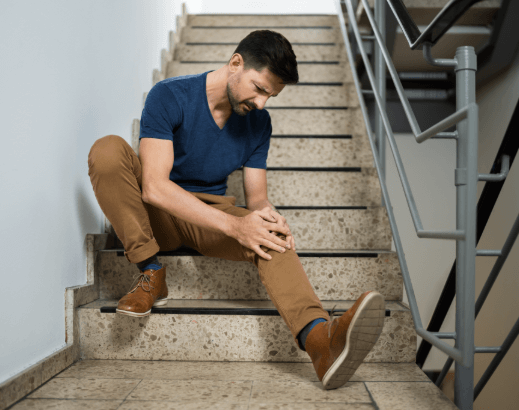Why Slip and Fall Cases Are Hard to Win Without a Lawyer

Slip and fall accidents might seem simple, but proving who is responsible can be difficult. Property owners and insurance companies often fight these claims hard, using legal tricks to avoid paying. Victims who try to manage their cases on their own may have trouble collecting the right evidence, dealing with insurance company tactics, or understanding complex legal steps. Without legal help, even a valid claim can fall apart, leaving the injured person without the financial support they need.
Many people think if they get hurt on someone else’s property, the owner is automatically responsible. In reality, slip and fall cases need proof that the property owner was careless and that their carelessness caused the accident. Even if a dangerous condition existed, the defense might argue that the victim was being careless or that the danger was obvious and could have been avoided.
How Property Owners Shift Blame to Avoid Liability
One of the biggest challenges in slip-and-fall cases is that property owners often deny responsibility. They may argue that the hazard was minor, that the victim wasn’t paying attention, or that nobody else reported the danger. Some even claim that the injured person was trespassing or wearing inappropriate shoes to shift the blame away from themselves. Without legal help, victims often find it hard to counter these claims.
Another common defense is that the property owner didn’t have enough time to fix the hazard before the accident. For instance, if a customer spills something on the floor and someone slips just minutes later, the business might say they didn’t have a chance to clean it. To prove that the hazard was there long enough for the owner to act, you will need to access surveillance footage, maintenance records, and witness statements.
See also: How 35% Hydrogen Peroxide is Used in Holistic Health Practices
Why Proving Negligence Is More Complicated Than It Seems
To win a slip and fall case, you must show that a dangerous condition was present and that the property owner knew about it or should have known about it but did nothing to fix it. This involves proving that the owner ignored past complaints, failed to check for hazards regularly, or neglected basic maintenance. If you cannot prove negligence, the insurance company or a judge may reject your claim.
Gathering proof goes beyond just telling your story. You need evidence like surveillance footage, safety records, accident reports, and statements from expert witnesses to build a strong case. Without a lawyer, you might find it hard to find this evidence or present it correctly in court. Missing even one important piece of proof can weaken your claim and make it much harder to get compensation.
How Insurance Companies Use Delay Tactics Against Victims
Insurance companies often try to pay as little as possible. Many people who have slip and fall injuries do not fully understand their legal rights, making it easier for insurance companies to delay, deny, or offer low payments for claims. One way they do this is by extending the case long enough for important evidence to disappear, which makes it harder to prove what really happened. Victims who are unaware of these tactics may weaken their cases.
Another common tactic is pressuring injured people to accept a low settlement before they understand how serious their injuries are. Some slip-and-fall injuries, such as back pain or joint damage, may not show symptoms immediately but can worsen over time. Once a victim accepts a settlement, they lose the right to seek additional money, even if their medical condition gets worse.
The Importance of Gathering Evidence Immediately
After a slip and fall accident, the first moments are crucial for building a strong case. Victims should take photos of the hazard, collect contact information from witnesses, and request an incident report if the fall happened at a business. However, in the shock of the moment, many people forget to document the scene or think they can gather evidence later. Unfortunately, property owners often clean up hazards quickly, leaving little proof that the dangerous condition existed.
Medical records are also important for showing damages. Even if an injury doesn’t seem serious right away, visiting a doctor creates a clear link between the fall and the injury. Waiting to seek medical care may lead insurance companies to argue that something else caused the injury or that it wasn’t serious enough for compensation. A lawyer can help make sure all necessary documents are collected and used effectively to support the claim.
Why Legal Representation Increases Settlement Offers
Victims who represent themselves in slip-and-fall cases often receive lower settlement offers than those with legal representation. Insurance companies know that unrepresented individuals may not be familiar with the true value of their claim, making them more likely to accept a low payout. Without an attorney, victims may underestimate future medical expenses, lost wages, or long-term rehabilitation costs.
Having slip and fall legal representation from Ed Bernstein Injury Lawyers levels the playing field against insurance companies and property owners. Attorneys understand how to calculate the full value of a claim, factoring in pain and suffering, long-term care, and other hidden costs. They also handle negotiations, ensuring that victims aren’t pressured into accepting unfair settlements. With legal support, injured individuals have a much better chance of receiving the compensation they truly deserve.
What Happens If a Slip and Fall Case Goes to Trial?
Many slip and fall cases settle before going to court, but some require a trial. This happens when the property owner denies responsibility or when the insurance company does not offer a fair settlement. Taking a case to trial involves presenting evidence, questioning witnesses, and responding to legal defenses. This can be overwhelming for someone without legal experience. Mistakes in court procedures or testimony can weaken the case and reduce the chances of success.
Attorneys prepare for trial by gathering expert testimony, reconstructing the accident, and building strong legal arguments. They know how to challenge misleading defenses and present a strong case to a judge or jury. Without a lawyer, victims may make mistakes that could result in their case being dismissed. Having an experienced lawyer improves the chances of a positive outcome, whether through settlements or in court.
Winning a Slip and Fall Case Requires Strategy and Expertise
Slip and fall cases may seem simple, but they are often some of the hardest personal injury claims to win. Property owners deny responsibility, insurance companies fight payouts, and proving negligence requires solid evidence and legal skill. Without professional representation, injured victims may struggle to navigate the system and recover fair compensation. Every step of the legal process matters, from documenting the accident to negotiating settlements.
Hiring an attorney significantly improves the chances of success in a slip-and-fall case. Legal professionals know how to build strong arguments, counter insurance company tactics, and present evidence effectively. Victims deserve compensation for their injuries, lost wages, and pain—having the right legal support ensures that they don’t settle for less than what they are owed.





